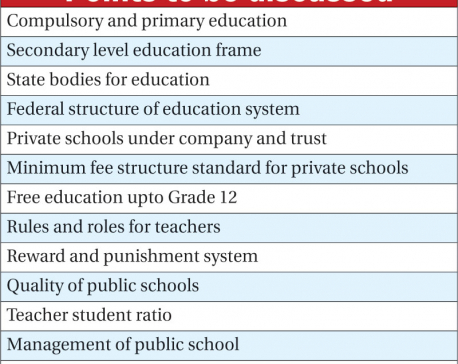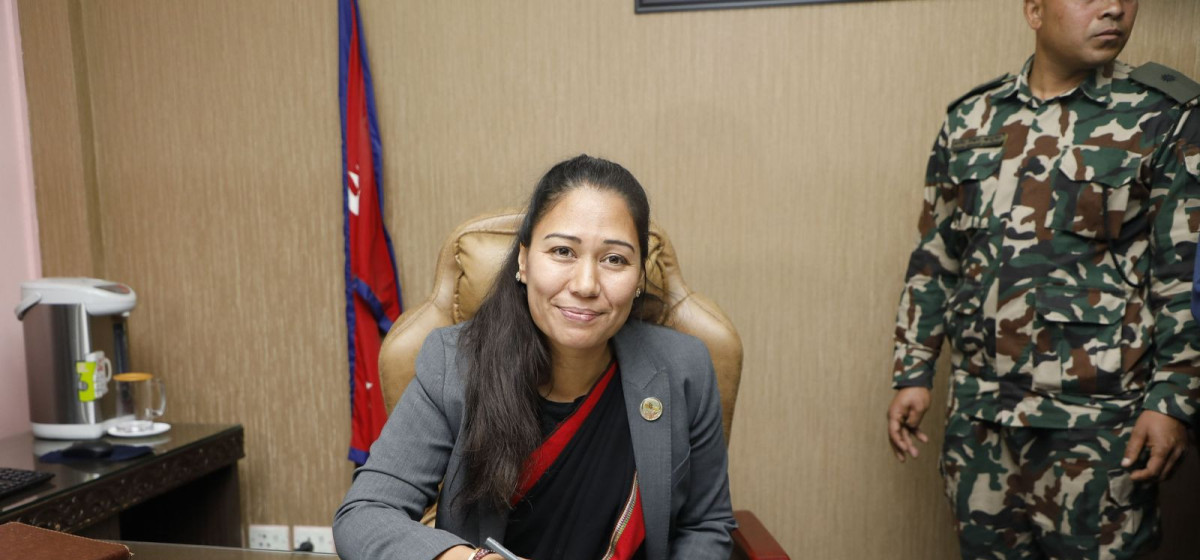
OR
Reimagining regulations
Published On: July 11, 2020 11:00 AM NPT By: Subarna Shakya and Bimal Pratap Shah

Subarna Shakya and Bimal Pratap Shah
Subarna Shakya was awarded the title of ‘100 Most Dedicated Professor’ by the World Education Congress. Bimal Pratap Shah is a policy wonk.news@myrepublica.com
While the concept of AI politicians has started to dominate the public discourse in many parts of the world, the government of Nepal is still clueless about harnessing the power of the AI to deliver better governance.
The Fourth Industrial Revolution, enabled by extraordinary technology like Artificial Intelligence (AI), represents a new paradigm in human development. AI is a technical term used to describe artifacts used to detect contexts or to effect actions in response to detected contexts. Many businesses are already using AI to prescribe sophisticated shopping experiences, drive productivity, and increase efficiency. AI is also proving to be an effective tool in battling the coronavirus pandemic that has already killed hundreds of thousands of people worldwide. The use of AI will fully replace ICT systems that are in use today because intelligent systems are capable of learning. At the same time, the growth in AI adoption poses a greater threat in the future in the absence of proper government oversight. Therefore, many experts believe formulating a far-reaching regulation will be crucial if risks are to be minimized to fully harness the potential benefits.
Even though AI is a new and ungoverned space, governments have already realized the need for effectively regulating the technology, but there is a risk they might end up formulating suboptimal regulatory policies in an ad-hoc manner due to lack of expertise. The World Economic Forum’s Center for the Fourth Industrial Revolution has been aware of these challenges faced by the governments for quite some time. To help governments adopt AI effectively, the center in partnership with the New Zealand Government recently released a “Framework for Reimagining Regulation for the Age of AI”.
The framework prescribes innovative approaches and tools to assist governments realize the need for upgrading the existing regulatory environment to ensure trustworthy design and deployment of AI. Currently, many advanced countries have been managing protections within their existing legal and regulatory systems. For example, more than 80 percent of AI-related issues are currently covered by existing legislation in New Zealand. This, however, is a short term solution. Legislation usually cannot keep up with the accelerating pace of change of AI, if governments are not serious about upgrading the law to match the rapidly evolving innovative technology.
The framework developed by the WEF focuses on three main areas: (i) National conversation, (ii) Regulatory capabilities and institutional design, and (ii) Risk/benefit assessment of AI systems for the government. Trust is crucial for the wider acceptance of AI as well as for gaining the social license to use its full potential. Since many still do not trust AI, it is necessary to engage in an open and honest conversation with the populace. The government, however, should take the leadership to encourage national discussion on AI.
Governments have to create a new institution solely responsible for AI. The agency should develop AI strategies, share best practices, encourage or incentivize the ethical use of AI, and identify gaps in the existing laws and suggest solutions. Such a body will have to be staffed by experts rather than generalists. If approached in an incorrect manner AI may be ineffective, leading to unethical outcomes, erosions of individual privacy/security, and abuses of human rights. There should be a separate entity to regulate AI and algorithms.
Risk benefits assessment frameworks should be introduced for AI systems used in the government. Developing in-house expertise will be important to effectively assess risks and benefits. The government of Canada has developed the Algorithmic Impact Assessment (AIA), a questionnaire designed to help assess and mitigate the risks associated with deploying AI within a government agency. In 2019, the UK government released its new procurement guidelines for AI-powered services to inform and empower buyers in the public sector to evaluate suppliers, and then confidently and responsibly procure AI technologies. Singapore, in 2020, released the second edition of its Model AI Governance Framework designed to convert relevant ethical principles to implementable practices in an AI deployment process.
The government’s AI agency should be staffed with highly skilled experts and thinkers because it will soon disrupt representative democracy as well. Politicians have failed to deliver. As a result, people have started to bet on AI to make governance decisions instead of the politicians. Since the world is still far from reaching such an era, it will have to embrace hybrid decision making. Politicians can harness the power of AI and data science to enable them to make better, more enlightened, and evidence-based decisions to deliver better public value. Data-driven policy-making is a step in the right direction to improve the currently flawed governance system. But for this to work, people have to start electing smart and principled people.
Even though AI politician is a radical idea, many countries have already started experimenting with the concept. During the last presidential elections in Russia, “Alice,” an AI system using a campaign slogan “the president who knows you best” ran for president. She received a couple of thousand votes which is a good achievement for an AI candidate. During the last mayoral race in Tama, a town in Tokyo, a machine named “Michihito Matsuda” stood for the local elections. The AI candidate believed in delivering on fair and balanced politics by using dialogue and intake from residents to calculate the best course of action. The robot politician did not win the election but secured the third position. In New Zealand, “Sam”, a machine is set to run in the 2020 general elections. It has been regarded as the first truly virtual politician in the world. Even though AI politicians have not yet won an election, the very fact that people are voting for them provides a peek into the future.
At a time when the concept of AI politicians has started to dominate the public discourse in many parts of the world, the government of Nepal is still clueless about harnessing the power of the AI to deliver better governance. AI is already disrupting the strict top-down approach of governance and if the government hopes to survive the coming disruption, it will have to incorporate a more data-driven, public-focused, and agile approach.
Furthermore, the government has to understand the disruption brought about by AI requires faster policy-making to take advantage of the technology to benefit society. More importantly, only governments that can create legislation and policies quickly to promote AI-adoption are going to survive the Fourth Industrial Revolution. Sadly, for the better or the worse, AI has not yet entered the mainstream political discourse in Nepal.
Nepal missed the first, second, and third industrial revolutions. It seems the country is going to miss the Fourth Industrial Revolution as well.
Shakya was awarded the ‘100 Most Dedicated Professors’ Award by the World Education Congress in 2019 and Shah is a policy wonk.
You May Like This

Should we be worried about AI?
On January 2, the BBC reported about a study regarding the use of artificial intelligence in making medical diagnosis. The... Read More...

Joint regulations clear way for parliamentary hearings committee
KATHMANDU, June 23: A joint sitting of the House of Representatives and the National Assembly on Friday endorsed the joint parliamentary... Read More...

MoE to hold discussions for new education regulations
KATHMANDU, Sept 22: The Ministry of Education (MoE) is all set to hold formal discussions on the formulation of new education... Read More...
Just In
- KMC to organize a month-long skill fair from May 1
- Birgunj Metropolis collects over Rs 360 million in revenue
- NEPSE plunges below 2,000 points after one and a half months; daily turnover declines to Rs 2.10 billion
- AI Index Report-2024: AI still behind humans on complex tasks like competition-level mathematics
- Daiji-Jogbudha road construction at snail’s pace
- Govt fails to adopt podway technology despite its potential in Nepal
- Jhulaghat border crossing in Baitadi to remain closed from this evening
- Universities will be free from partisan interests: Education Minister


















Leave A Comment